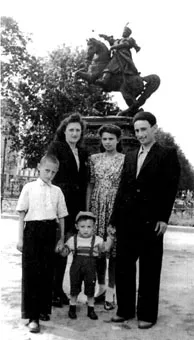Sholom Rondin with his wife Feiga, sons Gennadiy and Matvey, and Sholom Rondin’s sister Dusia Karminskaya
My family during a walk in Lvov in 1950. From left to right: my older son Gennadiy Rondin, my wife Feiga Rondina, my sister Dusia Karminskaya visiting us, I, Sholom Rondin, and my younger son Matvey Rondin.
I went to Lvov. I liked the town and found many job opportunities there. However, we didn't get any place to live. Those people lied to us and we quit working for them. We worked in restaurants. I found a vacant apartment that belonged to a Polish family. There were many vacant apartments in the town. I obtained a residential permit for us to reside in this apartment and we moved in there. It was an old apartment in an old house, but there were two rooms and tiled stoves in it. I refurbished this apartment and went to Gomel to move my family to Lvov. My wife already had our second baby (1947). We named him Matvey, but called him Marek in the family.
We've lived in Lvov since 1948. My wife didn't have to go to work. I provided well for the family. We gradually made friends. Most of them were my co-workers. We had Jewish, Ukrainian and Polish friends. We celebrated Soviet holidays, went to parades, sang Soviet songs and got together at birthdays. We didn't observe any traditions or celebrate holidays. We didn't even know the dates of Jewish holidays. The Soviet power didn't allow to publish Jewish calendars. We didn't go to synagogue. We were not interested ourselves and didn't want to involve our children in those outdated and unnecessary rituals.
My wife and children spent summer vacations with her parents in Gomel. Her father continued to work as a tailor, only he worked at home. My wife's parents lived a traditional Jewish life celebrating holidays and attending the only synagogue in Gomel that survived in the war. They bought matsah at Pesach and sent some to us in Lvov. They couldn't follow the kashrut, as there was no kosher food, but they observed Jewish traditions whenever they could. When my older son Gennadiy turned 13 my father-in-law insisted that we invited a rabbi home to conduct the ritual of Bar mitzvah. I had no objections - I always treated older people with respect. As for my son, I don't think he was impressed at all. Only few families had this ritual conducted for their children and my son believed it to be a vestige of the past that he had to go through.
Our sons were good boys. They were successful at school. My wife was raising them, as I spent a lot of time at work. I don't remember any discussions in our family related to the issues of nationality. Our children studied in a Russian secondary school where there was a number of Jewish teachers and schoolchildren. They spent their summer vacations with my wife's parents in Gomel. My mother also loved them dearly. They enjoyed going to pioneer camps.
My sons were not raised Jewish, but they always identified themselves as Jews. My older son knew Yiddish since he was a child. However, they married Russian girls. I wished they had married Jewish girls.












